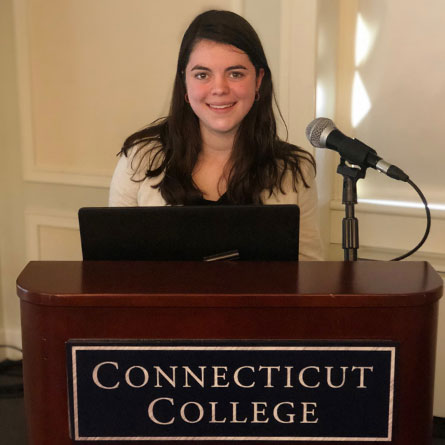
Emma Horst-Martz
Philadelphia, Pennsylvania
American Studies major, Anthropology minor
Choosing to major in anthropology at Connecticut College offers students a unique opportunity to engage deeply with both theoretical and applied aspects of the discipline. The department’s course offerings reflect its commitment to the liberal arts by providing a comprehensive and interdisciplinary education that is both globally aware and locally engaged.
Contemporary Challenges. One of the standout features of the anthropology program at Connecticut College is its commitment to addressing global challenges. Courses like Food, Climate, and Culture, Muslim Cultures and Societies, Religion and Climate Change, and Migration Crisis in Europe demonstrate how the department integrates critical global issues into the curriculum, allowing students to explore the intersections between environmental challenges, cultural practices, and social justice. These courses prepare students to tackle pressing contemporary issues through an anthropological lens.
Archaeology and Material Culture. Another key strength of the department’s curriculum is evident in its commitments to archaeology, material culture, and museum studies. Courses like Archaeology of North America, Field Archaeology Methods, Lab Archaeology Methods, and Experimental Archaeology provide hands-on experience and prepare students for practical careers in archaeology, heritage management, and archaeological curation. Other courses, like Discard(-ers)(-ing)(-ables), are distinctive for combining archaeological and ethnographic methods to explore the illicit, invisible, fringe, and otherwise seldom-studied elements of our modern material worlds. The Certificate Program in Museum Studies offers Anthropology students an opportunity to explore museum career paths that draw on the knowledge and expertise of anthropologists and archaeologists. Courses in museum studies consider such issues as material culture research, the colonial origins of museum collections, repatriation of Indigenous objects, and ethical ways of representing other cultures through exhibition curation and museum education.
Social Justice and Inequality. The anthropology program at Connecticut College is also deeply committed to exploring issues of power, inequality, and social justice. Courses like Decolonizing Anthropology and Power and Inequality challenge students to critically examine how power structures shape societies and contribute to global inequalities. This focus on social justice is integral to understanding and addressing issues like poverty, migration, and systemic racism, making the program particularly relevant to students passionate about making a difference in the world.
Students can also draw on the expertise of faculty in other departments—Art History, East Asian Languages & Cultures, Museum Studies, Music, and Slavic Studies—who have training in anthropology. Through these crosslisted courses, the Anthropology Department offers a wider array of courses than typical of a small liberal arts college.

Philadelphia, Pennsylvania
American Studies major, Anthropology minor
Anthropology Department
Mailing Address
Connecticut College
Anthropology Department
270 Mohegan Ave.
New London, CT 06320
Campus Location
Winthrop House